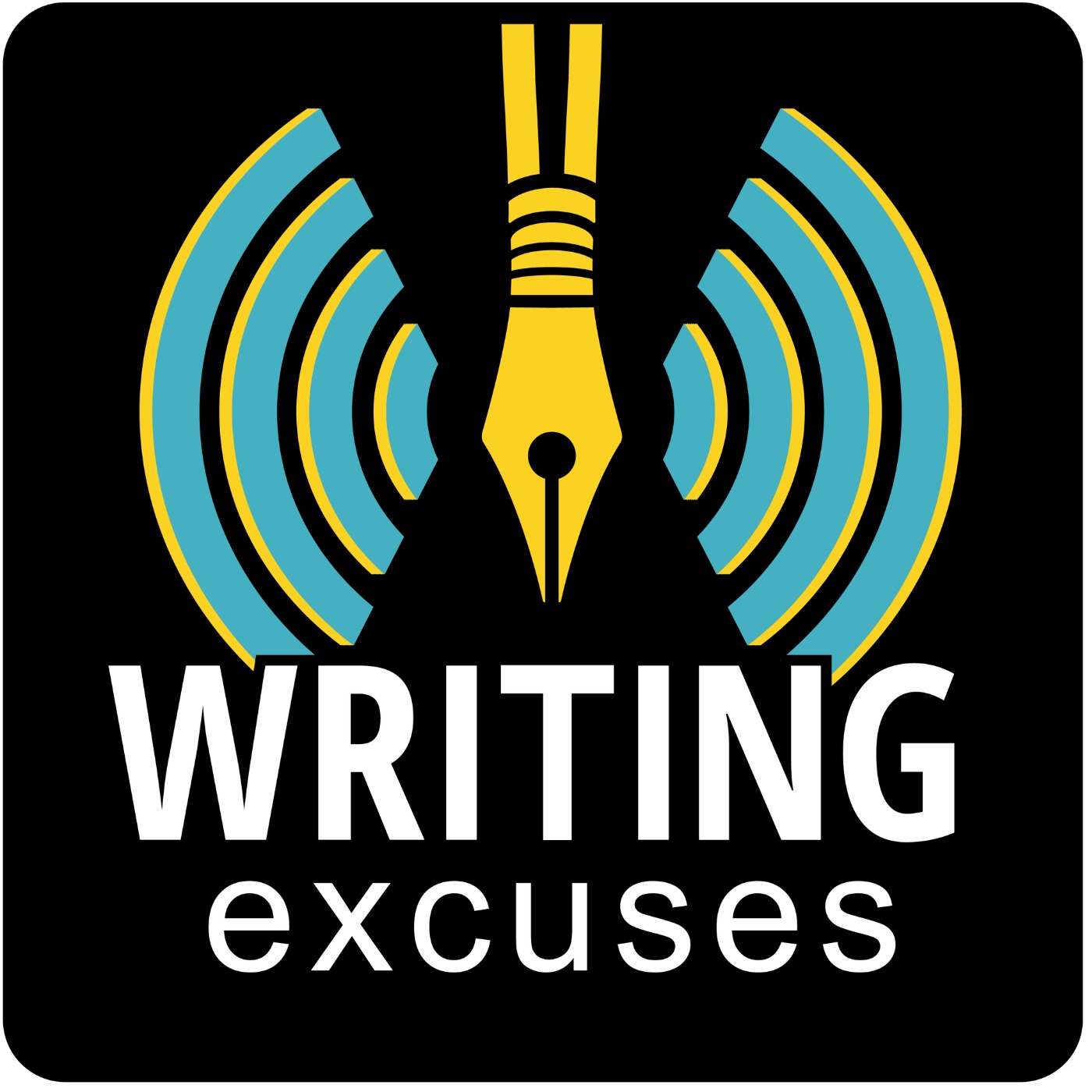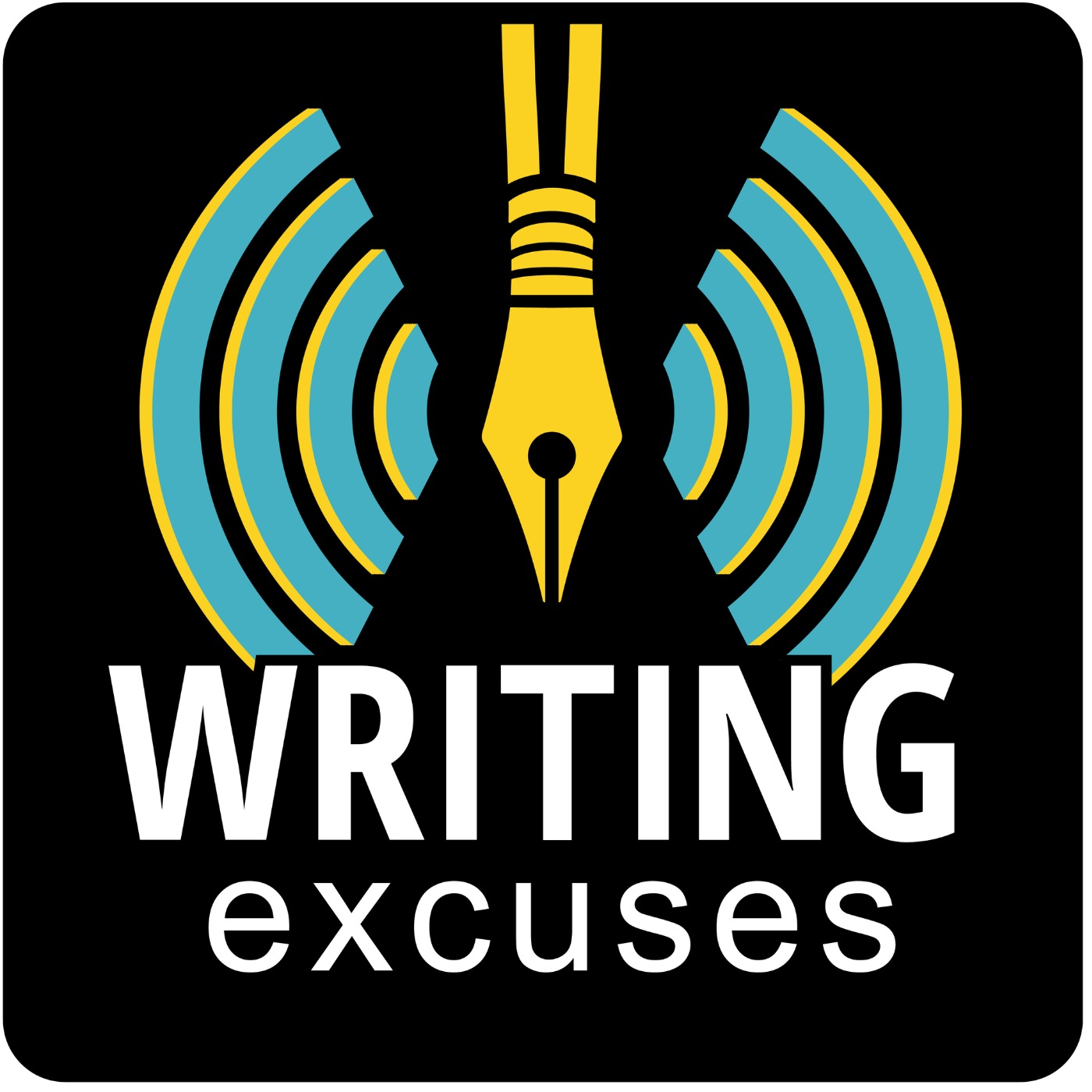Discover Writing Excuses
Writing Excuses

Writing Excuses
Author: Mary Robinette Kowal, DongWon Song, Erin Roberts, Dan Wells, and Howard Tayler
Subscribed: 26,126Played: 780,494Subscribe
Share
© 2008-2023 Writing Excuses LLC. 845972
Description
Mary Robinette Kowal, DongWon Song, Erin Roberts, Dan Wells, and Howard Tayler discuss writing techniques in a fast-paced format. A weekly podcast about the craft and business of writing.
978 Episodes
Reverse
It's time to talk about alpha readers, and we start with a caveat from Howard: "I don't want to read your book." Let's face it, we here at Writing Excuses might be great alpha readers, but we're not YOUR alpha readers. We can't be your back-door to fame and fortune as a genre fiction writer. The good news? There are good alpha readers out there waiting for you. You just need to know how to find them.
We talk about conventions a bit, those places that are full of genre-fiction lovers who might be able to help. We talk about Brandon's writing group (his alpha readers) and how his agent and editor are actually beta readers. This contrast illustrates the sort of things you should be looking for in an alpha reader. We talk about Howard's alpha reader (Sandra) and how she has to look at a script with no pictures, no blocking, and no dialog tags and figure out whether or not it's going to work. This illustrates how she's a genius and Howard's just a hack.
Brandon and Dan also cover what they do not want in alpha readers -- poor delivery of criticism and proof-reading topping the list.
And then we finally get around to some tricks for building a solid stable of alpha readers. It's not something you're going to pull off overnight.
Audiobook Pick-of-the-Week: The Dragon Factory: The Joe Ledger Novels, Book 2 by Jonathan Mayberry, narrated by Ray Porter.
Writing Prompt: Any time you've caught cold you're actually being possessed. Gesundheit.
Loud Howard: brought to you by a too-close microphone. Jordo did his best to fix this in post, but we don't record on multiple channels so there's only so much that can be done on our budget.
This episode of Writing Excuses has been brought to you by Audible.
Visit http://AudiblePodcast.com/excuse for a free trial membership*.
*Note: From the Audible website, here are the terms of the free membership. Read the fine print, please!
Audible® Free Trial Details
Get your first 14 days of the AudibleListener® Gold membership plan free, which includes one audiobook credit. After your 14 day trial, your membership will renew each month for just $14.95 per month so you can continue to receive one audiobook credit per month plus members-only discounts on all audio purchases. A very small number of titles are more than one credit. Cancel your membership before your free trial period is up and you will not be charged. Thereafter, cancel anytime, effective the next billing cycle. Any unused audiobook credits will be lost at cancellation.
Our Sponsors:
* Check out Quince: https://quince.com/wx
Support this podcast at — https://redcircle.com/writing-excuses2130/donations
Advertising Inquiries: https://redcircle.com/brands
Privacy & Opt-Out: https://redcircle.com/privacy
Your Hosts: Mary Robinette Kowal, Cassandra Khaw, Dan Wells, James L. Sutter, and Howard Tayler
Worldbuilding is one of our favorite topics, and it's a domain in which game design and novel writing share a lot of territory. In this episode we talk about how much we love it, and how much we enjoy letting other people love it enough to do the heavy lifting for us.
Credits: This episode was recorded by Marshall Carr, Jr., and mastered by Alex Jackson
Our Sponsors:
* Check out Quince: https://quince.com/wx
Support this podcast at — https://redcircle.com/writing-excuses2130/donations
Advertising Inquiries: https://redcircle.com/brands
Privacy & Opt-Out: https://redcircle.com/privacy
Learning is great, but how do you translate it into doing without getting overwhelmed? What is the difference between learning in the classroom and executing when you're on your own?Marshall, our incredible recording engineer, just finished an MFA program. Congrats, Marshall!! On today’s episode, we gril Marshall in order to understand his takeaways from the program. Specifically, we are interested in how he takes everything he learned in the classroom and turns it into actionable things he’s doing on the page. We talk community, motivation, and how to consistently make time for your writing. Thing of the Week: The Fall of the House of Usher, TV show created by Mike FlanaganHomework: Take a turn being the teacher– how would you teach a group of people about a concept you’re struggling with in your own work, and what homework would you give them to better understand it? Close Reading Series: Texts & TimelineNext up is Character! Starting July 7, we’ll be diving into three short stories by C.L. Clark. These are all available for free through Uncanny Magazine. Character: “You Perfect, Broken Thing,” “The Cook,” and “Your Eyes, My Beacon: Being an Account of Several Misadventures and How I Found My Way Home” by CL Clark (starting July 7) And a sneak peak on the rest of the year… Tension: Ring Shout by P. Djèlí Clark (starting September 1) Structure: The Fifth Season by N.K. Jemisin (starting October 13) Sign up for our newsletter: https://writingexcuses.comCredits: Your hosts for this episode were Mary Robinette Kowal, DongWon Song, Erin Roberts, Dan Wells, and Howard Tayler. It was produced by Emma Reynolds, recorded by Marshall Carr, Jr., and mastered by Alex Jackson.Join Our Writing Community! PatreonInstagramYouTubeFacebookTwitterOur Sponsors:* Check out Quince: https://quince.com/wxSupport this podcast at — https://redcircle.com/writing-excuses2130/donationsAdvertising Inquiries: https://redcircle.com/brandsPrivacy & Opt-Out: https://redcircle.com/privacy
Grounding a reader starts in the very first lines of a story. Where are we? Who are we with? What kind of story are we in? Our hosts explore how emotion, context, and sensory detail work together to create immersion, and why action alone isn’t enough without an emotional lens. From relatable sensory cues to carefully chosen specifics, they break down how small details can anchor even the biggest explosions. When readers step into a story, we want them oriented, invested, and ready to follow.
Homework:
Take the opening of your work in progress and write out only the physical actions — what is happening and what the character is doing. Then annotate it with the emotions you want attached to each moment, and rewrite the scene integrating both action and emotion.
Final WXR Cruise!
Our final WXR cruise sets sail for Alaska in September 2026—get your tickets here!
Credits: Your hosts for this episode were Erin Roberts, DongWon Song, and Mary Robinette Kowal. It was produced by Emma Reynolds, recorded by Marshall Carr, Jr., and mastered by Alex Jackson.
Join Our Writing Community!
Writing Retreats
Newsletter
Patreon
Instagram
Threads
Bluesky
TikTok
YouTube
Facebook
Our Sponsors:
* Check out Quince: https://quince.com/wx
Support this podcast at — https://redcircle.com/writing-excuses2130/donations
Advertising Inquiries: https://redcircle.com/brands
Privacy & Opt-Out: https://redcircle.com/privacy
In this episode, we explore what it really means to set reader expectations at the beginning of a story. We talk about how openings communicate the shape of what’s to come — from genre and tone to the kind of emotional ride we’re inviting our readers onto. We dig into practical tools for building reader trust early: making (and fulfilling) small promises, letting readers feel clever, answering questions before raising bigger ones, and controlling tone so the story delivers on what it signals. Because when readers check the label on page one, we want to be sure we can deliver.
Homework:
Review the first chapter of your work in progress and make a list of all the story promises you’ve made. Keep that list somewhere visible so you can track how—and when— you fulfill them.
ANNOUNCEMENTS:
FEBRUARY 15th: Cruise Prices Increase
The final WXR cruise sets sail for Alaska in September 2026—get your tickets now before prices increase on February 15th!
Credits: Your hosts for this episode were Erin Roberts, DongWon Song, and Mary Robinette Kowal. It was produced by Emma Reynolds, recorded by Marshall Carr, Jr., and mastered by Alex Jackson.
Join Our Writing Community!
Writing Retreats
Newsletter
Patreon
Instagram
Threads
Bluesky
TikTok
YouTube
Facebook
Our Sponsors:
* Check out Quince: https://quince.com/wx
Support this podcast at — https://redcircle.com/writing-excuses2130/donations
Advertising Inquiries: https://redcircle.com/brands
Privacy & Opt-Out: https://redcircle.com/privacy
To celebrate Mary Robinette’s birthday today (!!), she is taking us inside the craft (and emotional engine) of her short story “With Her Serpent Locks,” using it as a case study in beginnings, control, and creative “leveling up.” Our hosts dig into grounding the reader through myth, pattern, and delayed information, and how a familiar framework can make readers feel both clever and cared for. The conversation unpacks how intentional choices—like withholding names, structuring scenes around question words, and planting details early—create trust and momentum. Along the way, we talk honestly about what it feels like when craft skills become internalized and a story finally clicks into ease.
Homework:
Take a strong emotion you’ve felt recently and describe it as a metaphor. Then use that metaphor as a writing prompt.
Final WXR Cruise!
Our final WXR cruise sets sail for Alaska in September 2026—get your tickets here!
Credits: Your hosts for this episode were Marshall Carr, Erin Roberts, DongWon Song, and Mary Robinette Kowal. It was produced by Emma Reynolds, recorded by Marshall Carr, Jr., and mastered by Alex Jackson.
Join Our Writing Community!
Writing Retreats
Newsletter
Patreon
Instagram
Threads
Bluesky
TikTok
YouTube
Facebook
Our Sponsors:
* Check out Quince: https://quince.com/wx
Support this podcast at — https://redcircle.com/writing-excuses2130/donations
Advertising Inquiries: https://redcircle.com/brands
Privacy & Opt-Out: https://redcircle.com/privacy
In this episode, our hosts dive into what makes a strong beginning and why it matters so much to readers. They talk about openings as an act of hospitality, exploring how tone, control, and carefully chosen details help readers feel grounded and cared for from the first page. Using the metaphor of hosting a party, they unpack common mistakes like starting too early, overwhelming readers with detail, or failing to make a clear promise. The discussion also reassures writers that beginnings often change in revision—and that’s not just normal, it’s necessary.
Homework:
Create an artificial slush pile of beginnings. Read them cold and note which ones make you lean in and why.
ANNOUNCEMENTS:
FEBRUARY 15th: Cruise Prices Increase
The final WXR cruise* sets sail for Alaska in September 2026—get your tickets now before prices increase on February 15th!
Credits: Your hosts for this episode were Erin Roberts, DongWon Song, and Mary Robinette Kowal. It was produced by Emma Reynolds, recorded by Marshall Carr, Jr., and mastered by Alex Jackson.
Join Our Writing Community!
Writing Retreats
Newsletter
Patreon
Instagram
Threads
Bluesky
TikTok
YouTube
Facebook
Our Sponsors:
* Check out Quince: https://quince.com/wx
Support this podcast at — https://redcircle.com/writing-excuses2130/donations
Advertising Inquiries: https://redcircle.com/brands
Privacy & Opt-Out: https://redcircle.com/privacy
Today, our hosts dig into how stories can feel fresh without losing what readers love. They explore the idea of “same but different” across genres, sequels, and series—looking at how small shifts in structure, context, tone, or theme can create meaningful novelty. Drawing on examples from novels, film, television, and games, we unpack how patterns, expectations, and core questions shape reader experience. Our conversation also widens to encompass the larger question of how writers can evolve while still feeling recognizably like themselves.
Homework:
Choose two works from the same franchise or series. Break down what stayed the same and what changed, then reflect on which choices felt satisfying, surprising, or off-putting—and why.
ANNOUNCEMENTS:
2/15 Cruise Prices Increase
The final WXR cruise* sets sail for Alaska in September 2026—get your tickets now before prices increase on February 15th!
Credits: Your hosts for this episode were Erin Roberts, DongWon Song, and Mary Robinette Kowal. It was produced by Emma Reynolds, recorded by Marshall Carr, Jr., and mastered by Alex Jackson.
Join Our Writing Community!
Writing Retreats
Newsletter
Patreon
Instagram
Threads
Bluesky
TikTok
YouTube
Facebook
Our Sponsors:
* Check out Quince: https://quince.com/wx
Support this podcast at — https://redcircle.com/writing-excuses2130/donations
Advertising Inquiries: https://redcircle.com/brands
Privacy & Opt-Out: https://redcircle.com/privacy
In this episode, our hosts take on the Hero’s Journey—where it came from, why it endures, and why it can make writers uneasy. They break it down as a tool (and not a rule), exploring how pattern recognition works in storytelling without turning structure into a formula. Along the way, they discuss reluctant heroes, mentors, departures, and returns, using familiar examples from fantasy, film, and beyond. The conversation also digs into how stories can satisfy expectations—or deliberately invert them—without becoming predictable or tropey.
Homework:
Take a simple outline of the Hero’s Journey (we’ll include one in the liner notes). On an index card or Post-it, list as many stories, films, or shows as you can that follow this pattern, just to see how and where it shows up.
ANNOUNCEMENTS:
2/15 Cruise Prices Increase
The final WXR cruise* sets sail for Alaska in September 2026—get your tickets now before prices increase on February 15th!
Credits: Your hosts for this episode were Erin Roberts, DongWon Song, and Howard Tayler. It was produced by Emma Reynolds, recorded by Marshall Carr, Jr., and mastered by Alex Jackson.
Join Our Writing Community!
Writing Retreats
Newsletter
Patreon
Instagram
Threads
Bluesky
TikTok
YouTube
Facebook
Our Sponsors:
* Check out Quince: https://quince.com/wx
Support this podcast at — https://redcircle.com/writing-excuses2130/donations
Advertising Inquiries: https://redcircle.com/brands
Privacy & Opt-Out: https://redcircle.com/privacy
Plot isn’t a set of commandments—it’s a collection of patterns we’ve learned to recognize. This episode kicks off the season’s deep dive into deconstructing plots, asking what different story structures are really doing beneath the surface and why they work (or don’t). Our hosts unpack plot as a toolbox rather than a formula, exploring action plots vs. emotion plots, Western vs. non-Western structures, and how audience expectations shape everything from middles to endings. This conversation reframes plot as a way to pull readers through a story—not to box writers in.
Homework:
Pick a story you enjoy and gently reverse-engineer it. Go scene by scene and label each one simply as “good thing happened” or “bad thing happened.” Look for patterns you didn’t realize were there.
ANNOUNCEMENTS:
2/15 Cruise Prices Increase
The final WXR cruise* sets sail for Alaska in September 2026—get your tickets now before prices increase on February 15th!
Credits: Your hosts for this episode were Erin Roberts, DongWon Song, and Mary Robinette Kowal. It was produced by Emma Reynolds, recorded by Marshall Carr, Jr., and mastered by Alex Jackson.
Join Our Writing Community!
Writing Retreats
Newsletter
Patreon
Instagram
Threads
Bluesky
TikTok
YouTube
Facebook
Our Sponsors:
* Check out Quince: https://quince.com/wx
Support this podcast at — https://redcircle.com/writing-excuses2130/donations
Advertising Inquiries: https://redcircle.com/brands
Privacy & Opt-Out: https://redcircle.com/privacy
This week, we turn our attention to one of the most stubborn traps writers fall into: assuming someone else’s process should work for you. Building on last episode’s conversation about intentions, the hosts shift the focus from what you should do to how you can figure out what actually works, starting with observation, pattern-spotting, and a little self-compassion.
The discussion moves through practical ways to lower friction and build supportive rituals—linking tasks together, listening to physical and emotional cues, and treating yourself like your own best assistant. Along the way, the hosts emphasize that your reactions are data, your process is allowed to change, and permission to be human is often the missing tool. The goal isn’t discipline for discipline’s sake, but a writing life that adapts to you.
Homework:
Make a list of all the steps in your writing process, starting with the smallest, most concrete actions and working outward to the bigger ones. Then go through that list and notice which parts are serving you, which aren’t, and which you might want to change—without worrying yet about how to change them.
ANNOUNCEMENTS:
Last Annual Cruise
The final WXR cruise* sets sail for Alaska in September 2026—don’t miss your chance to be part of it. Learn more and sign up here.
Call for Writing Breakthroughs
Have you had a breakthrough in your writing because of Writing Excuses? If so, we want to hear about it. Fill out this Writing Breakthroughs Google Form for a chance to be featured in a WX Newsletter!
Credits: Your hosts for this episode were Erin Roberts, DongWon Song, and Mary Robinette Kowal. It was produced by Emma Reynolds, recorded by Marshall Carr, Jr., and mastered by Alex Jackson.
Join Our Writing Community!
Writing Retreats
Newsletter
Patreon
Instagram
Threads
Bluesky
TikTok
YouTube
Facebook
Our Sponsors:
* Check out Quince: https://quince.com/wx
Support this podcast at — https://redcircle.com/writing-excuses2130/donations
Advertising Inquiries: https://redcircle.com/brands
Privacy & Opt-Out: https://redcircle.com/privacy
Season 21 kicks off with a new theme, a fresh tagline, and a renewed focus on what Writing Excuses has always been about: tools, not rules. The hosts unpack why prescriptive writing advice so often falls short, and how understanding why tools gives you the freedom to adapt—or discard—them.
And so for Season 21, we’re going to focus on deconstructing structure in order to better understand the tools that make up various story structures, and what we can learn from each. We’ll be analyzing everything from exposition to Try/Fail cycles to Save the Cat, as we dig into how structure can function more like jazz and less like a rigid formula. We hope this year of episodes (every Sunday morning, folks!) helps you choose what actually serves you as a writer.
Homework
Write down one thing you are letting go of from last year, starting with the sentence “I am letting go of…”. Then write one intention for the new year, starting with “This year I am embracing…”.
ANNOUNCEMENTS:
Last Annual Cruise
The final WXR cruise* sets sail for Alaska in September 2026—don’t miss your chance to be part of it. Learn more and sign up here.
Call for Writing Breakthroughs
Have you had a breakthrough in your writing because of Writing Excuses? If so, we want to hear about it. Fill out this Writing Breakthroughs Google Form for a chance to be featured in a WX Newsletter!
Credits: Your hosts for this episode were Howard Tayler, Erin Roberts, DongWon Song, and Mary Robinette Kowal. It was produced by Emma Reynolds, recorded by Marshall Carr, Jr., and mastered by Alex Jackson.
Join Our Writing Community!
Writing Retreats
Newsletter
Patreon
Instagram
Threads
Bluesky
TikTok
YouTube
Facebook
Our Sponsors:
* Check out Quince: https://quince.com/wx
Support this podcast at — https://redcircle.com/writing-excuses2130/donations
Advertising Inquiries: https://redcircle.com/brands
Privacy & Opt-Out: https://redcircle.com/privacy
As our 20th season comes to a close, we reflect on the end of 2025 and a major transition for the show, as Dan Wells steps away from Writing Excuses as a full-time core host. Dan shares the thoughtful, hard-won reasoning behind his decision, while the rest of the team reflects on what his presence has meant to this podcast and our community.
We recorded the first half of this episode in June and the second half in December 2025. Why is that? Because we wanted to discuss our plans for the rest of the year and later return to see how those plans actually played out—a kind of time capsule for all of us. Along the way, we talk candidly about change, ambition, and the reality of creative lives that rarely move in straight lines.
Homework:
1. We've created a publicly accessible Patreon post titled “Thank you Dan Wells” for you, our listeners, to share things you've learned from Dan, appreciation you wish to express, or even your favorite stories about Dan. Go to patreon.com/WritingExcuses and look for this post.
2. Final Homework From Dan:
Watch some of the show Twisted Metal (warning: there’s a lot of gore and swearing). If that's not your cup of tea, then check out the interactive novel, The Book of Hungry Names by Kyle Marquis. See what you can learn from these pieces of media—they are master storytellers!
ANNOUNCEMENTS:
Last Annual Cruise
The final WXR cruise* sets sail for Alaska in September 2026—don’t miss your chance to be part of it. Learn more and sign up here.
*Scholarship applications for our cruise are open now until December 31st, 2025. You can learn more and apply here.
Call for Writing Breakthroughs
Have you had a breakthrough in your writing because of Writing Excuses? If so, we want to hear about it. Fill out this Writing Breakthroughs Google Form for a chance to be featured in a WX Newsletter!
Credits: Your hosts for this episode were Howard Tayler, Dan Wells, Erin Roberts, DongWon Song, and Mary Robinette Kowal (for the first half,. It was produced by Emma Reynolds, recorded by Marshall Carr, Jr., and mastered by Alex Jackson.
Join Our Writing Community!
Writing Retreats
Newsletter
Patreon
Instagram
Threads
Bluesky
TikTok
YouTube
Facebook
Our Sponsors:
* Check out Quince: https://quince.com/wx
Support this podcast at — https://redcircle.com/writing-excuses2130/donations
Advertising Inquiries: https://redcircle.com/brands
Privacy & Opt-Out: https://redcircle.com/privacy
A workflow that made daily writing (and comics) possible—Howard Tayler takes us through two decades of the delightfully eccentric process behind Schlock Mercenary: text boxes in landscape Word, laser-printed pages he inked by hand, and a system that kept comics coming even through long COVID and chronic fatigue.
The conversation shows how craft can stay constant even as ability, tools, and energy change. Howard shares how he rebuilt his systems to protect his writing time and created processes that served him. He also dives into practical hacks—index cards, banking writing time, moving your desk, and borrowing ideas from other creators. Expect puppy-training metaphors, unexpected tech, and a reminder that satisfaction can be the metric that matters.
Homework
Take a stack of index cards and storyboard one scene: on the front draw the panel (stick figures are fine), on the back handwrite the line of dialogue (add a little arrow to mark the speaker). Treat the scene like a comic—sequence the cards, play with the images, and see what visual problems or surprises show up.
ANNOUNCEMENTS:
Last Annual Cruise
The final WXR cruise* sets sail for Alaska in September 2026—don’t miss your chance to be part of it. Learn more and sign up here.
*Scholarship applications for our cruise are open now until December 31st, 2025. You can learn more and apply here.
Call for Writing Breakthroughs
Have you had a breakthrough in your writing because of Writing Excuses? If so, we want to hear about it. Fill out this Writing Breakthroughs Google Form for a chance to be featured in a WX Newsletter!
Credits: Your hosts for this episode were Howard Tayler, Dan Wells, Erin Roberts, Mary Robinette Kowal, and DongWon Song. It was produced by Emma Reynolds, recorded by Marshall Carr, Jr., and mastered by Alex Jackson.
Join Our Writing Community!
Writing Retreats
Newsletter
Patreon
Instagram
Threads
Bluesky
TikTok
YouTube
Facebook
Our Sponsors:
* Check out Quince: https://quince.com/wx
Support this podcast at — https://redcircle.com/writing-excuses2130/donations
Advertising Inquiries: https://redcircle.com/brands
Privacy & Opt-Out: https://redcircle.com/privacy
2 quick reminders: Scholarship applications for our 2026 cruise are open now until December 31st, 2025. You can learn more and apply here. AND early bird pricing for this cruise (going to Alaska in September 2026) ends on February 15th! Get your tickets here!
This week, Dan Wells opens up about how depression reshaped his writing process—and what rebuilding that process has looked like in the years since. The conversation ranges from tiny, mechanical steps to full-on cognitive reframing, with the hosts comparing notes on mindfulness, spectating, trauma responses, and even puppy-training techniques for rewiring your brain. They explore how environment, routine, and self-compassion can make the difference between staring at a blank screen and finding a way back into the work. Expect honesty, humor, and a lot of practical wisdom for how to care for your mental and emotional landscape while still trying to make art.
Homework:
Be kind to yourself—and extend that compassion to at least one person in your life who may be struggling, too. Then take a close look at your own rhythms, spaces, and habits to identify when and where you work best, and experiment with those ideal conditions this week.
ANNOUNCEMENTS:
Last Annual Cruise
The final WXR cruise sets sail for Alaska in September 2026—don’t miss your chance to be part of it. Learn more and sign up here.
*Scholarship applications for our cruise are open now until December 31st, 2025. You can learn more and apply here.
Call for Writing Breakthroughs
Have you had a breakthrough in your writing because of Writing Excuses? If so, we want to hear about it. Fill out this Writing Breakthroughs Google Form for a chance to be featured in a WX Newsletter!
Credits: Your hosts for this episode were Dan Wells, Erin Roberts, Mary Robinette Kowal, Howard Tayler, and DongWon Song. It was produced by Emma Reynolds, recorded by Marshall Carr, Jr., and mastered by Alex Jackson.
Join Our Writing Community!
Writing Retreats
Newsletter
Patreon
Instagram
Threads
Bluesky
TikTok
YouTube
Facebook
Our Sponsors:
* Check out Quince: https://quince.com/wx
Support this podcast at — https://redcircle.com/writing-excuses2130/donations
Advertising Inquiries: https://redcircle.com/brands
Privacy & Opt-Out: https://redcircle.com/privacy
This week, Mary Robinette pulls back the curtain on some of fiction’s sneakiest power tools: tone and mood. Drawing from a recent craft class she taught for her Patreon, Mary Robinette breaks down how these elements shape a reader’s emotional experience—and why they deserve as much attention as plot or structure. DongWon, Erin, and Howard jump in to poke at the definitions, debate where tone and mood collide, and explore how contrast, character reactions, and even sentence rhythm can totally change a scene. Expect examples ranging from Wizard of Oz to Mike Flanagan as we dig into practical ways to use tone and mood to supercharge your storytelling.
Homework:
Take a five-part mystery structure (crime → investigation → twist → breakthrough → conclusion) and write a story that uses that structure but is not obviously a mystery.
ANNOUNCEMENTS:
Last Annual Cruise
The final WXR cruise sets sail for Alaska in September 2026—don’t miss your chance to be part of it. Learn more and sign up here.
*Scholarship applications for our cruise are open now until December 31st, 2025. You can learn more and apply here.
Call for Writing Breakthroughs
Have you had a breakthrough in your writing because of Writing Excuses? If so, we want to hear about it. Fill out this Writing Breakthroughs Google Form for a chance to be featured in a WX Newsletter!
Credits: Your hosts for this episode were Erin Roberts, Mary Robinette Kowal, Howard Tayler, and DongWon Song. It was produced by Emma Reynolds, recorded by Marshall Carr, Jr., and mastered by Alex Jackson.
Join Our Writing Community!
Writing Retreats
Newsletter
Patreon
Instagram
Threads
Bluesky
TikTok
YouTube
Facebook
Our Sponsors:
* Check out Quince: https://quince.com/wx
Support this podcast at — https://redcircle.com/writing-excuses2130/donations
Advertising Inquiries: https://redcircle.com/brands
Privacy & Opt-Out: https://redcircle.com/privacy
In this episode, DongWon digs into one of the business topics of our upcoming craft book: pitching. How do you talk about your work so other people immediately understand its category, vibe, and why it matters? They break pitching into two parts—content (what you say) and presentation (how you say it)—and share concrete tools like comp titles, short taglines, and simple back-cover formulas to sharpen your pitch. You’ll hear how iteration, audience-awareness, and practicing aloud (think karaoke for pitches) turn a clumsy elevator spiel into something that lands. Tune in for hands-on advice you can use next time an editor, agent, bookseller, or potential reader asks, “So, what’s it about?”
Homework:
Write three short, 2–3-sentence pitches for your book (or other WIP) that each take a different angle—one focused on worldbuilding, one on character, one on plot. Then read them aloud to someone and watch where they light up, glaze over, or lean in, so you can see which pitch actually works.
ANNOUNCEMENTS:
Last Annual Cruise
The final WXR cruise sets sail for Alaska in September 2026—don’t miss your chance to be part of it. Learn more and sign up here.
*Scholarship applications for our cruise are open now until December 31st, 2025. You can learn more and apply here.
Call for Writing Breakthroughs
Have you had a breakthrough in your writing because of Writing Excuses? If so, we want to hear about it. Fill out this Writing Breakthroughs Google Form for a chance to be featured in a WX Newsletter!
Credits: Your hosts for this episode were Dan Wells, Erin Roberts, Mary Robinette Kowal, Howard Tayler, and DongWon Song. It was produced by Emma Reynolds, recorded by Marshall Carr, Jr., and mastered by Alex Jackson.
Join Our Writing Community!
Writing Retreats
Newsletter
Patreon
Instagram
Threads
Bluesky
TikTok
YouTube
Facebook
Our Sponsors:
* Check out Quince: https://quince.com/wx
Support this podcast at — https://redcircle.com/writing-excuses2130/donations
Advertising Inquiries: https://redcircle.com/brands
Privacy & Opt-Out: https://redcircle.com/privacy
Dan shares his experience of rebuilding and reinventing his writing career from his section of our forthcoming book Now Go Write. Our hosts walk through practical ways that writers can diversify their work— from writing for RPGs and video games to writing in a new genre like middle grade or nonfiction — and why having multiple, truly separate revenue streams matters. They also dig into the psychological work of redefining yourself as a writer (not only a novelist), staying flexible when setbacks hit, and protecting time for the projects that keep your heart in the work. Listen for concrete strategies and encouragement to lean into new formats without losing sight of why you write.
Homework: Write something in a genre or format you’ve never tried before — a single TV episode scene, a short RPG adventure, a tie-in short story, a script, or a 500–1,000-word nonfiction piece. And see how it feels!
ANNOUNCEMENTS:
Call for Writing Breakthroughs
Have you had a breakthrough in your writing because of Writing Excuses? If so, we want to hear about it. Fill out this Writing Breakthroughs Google Form for a chance to be featured in a WX Newsletter!
Last Annual Cruise
The final WXR cruise sets sail for Alaska in September 2026—don’t miss your chance to be part of it. Learn more and sign up here.
*Scholarship applications for our cruise are open now until December 31st, 2025. You can learn more and apply here.
Credits: Your hosts for this episode were Dan Wells, Erin Roberts, Mary Robinette Kowal, Hoard Tayler, and DongWon Song. It was produced by Emma Reynolds, recorded by Marshall Carr, Jr., and mastered by Alex Jackson.
Join Our Writing Community!
Writing Retreats
Newsletter
Patreon
Instagram
Threads
Bluesky
TikTok
YouTube
Facebook
Our Sponsors:
* Check out Quince: https://quince.com/wx
Support this podcast at — https://redcircle.com/writing-excuses2130/donations
Advertising Inquiries: https://redcircle.com/brands
Privacy & Opt-Out: https://redcircle.com/privacy
In this episode, Erin returns with the final two “rules” from her section of our forthcoming book Now Go Write—and why it might be worth breaking them. With DongWon and Mary Robinette, Erin explores the classic advice to “show, don’t tell,” and the debate over whether magic needs a system. We unpack when these conventions can strengthen a story—and when they can get in your way.
Homework: Choose one of the four rules Erin covered across both “Break All The Rules” episodes (20.45 & 20.46) and rewrite a scene from your own work to deliberately break it. See what changes when you do.
ANNOUNCEMENTS:
Call for Writing Breakthroughs
Have you had a breakthrough in your writing because of Writing Excuses? If so, we want to hear about it. Fill out this Writing Breakthroughs Google Form for a chance to be featured in a WX Newsletter!
Last Annual Cruise
The final WXR cruise sets sail for Alaska in September 2026—don’t miss your chance to be part of it. Learn more and sign up here.
Credits: Your hosts for this episode were Erin Roberts, Mary Robinette Kowal, and DongWon Song. It was produced by Emma Reynolds, recorded by Marshall Carr, Jr., and mastered by Alex Jackson.
Join Our Writing Community!
Writing Retreats
Newsletter
Patreon
Instagram
Threads
Bluesky
TikTok
YouTube
Facebook
Our Sponsors:
* Check out Quince: https://quince.com/wx
Support this podcast at — https://redcircle.com/writing-excuses2130/donations
Advertising Inquiries: https://redcircle.com/brands
Privacy & Opt-Out: https://redcircle.com/privacy
In this episode, Erin shares a sneak peek from her section of our forthcoming book, Now Go Write. (To learn more about our book, sign up for our newsletter!) Erin explores four classic writing “rules,” when it’s worth breaking them, and what that can reveal about your own craft. Today, our hosts dive into two of these rules—examining how they can both help and hinder your storytelling. Tune in next week for part two, when we tackle the remaining two rules that Erin wants us to break.
Homework: Write down some of the rules you think you follow most rigidly in your own writing. Take one of these rules and begin to think about ways you can challenge this rule, or break it, or soften it in some way!
ANNOUNCEMENTS:
Call for Writing Breakthroughs
Have you had a breakthrough in your writing because of Writing Excuses? If so, we want to hear about it. Fill out this Writing Breakthroughs Google Form for a chance to be featured in a WX Newsletter!
Last Annual Cruise
The final WXR cruise sets sail for Alaska in September 2026—don’t miss your chance to be part of it. Learn more and sign up here.
Credits: Your hosts for this episode were Erin Roberts, Mary Robinette Kowal, and DongWon Song. It was produced by Emma Reynolds, recorded by Marshall Carr, Jr., and mastered by Alex Jackson.
Join Our Writing Community!
Writing Retreats
Newsletter
Patreon
Instagram
Threads
Bluesky
TikTok
YouTube
Facebook
Our Sponsors:
* Check out Quince: https://quince.com/wx
Support this podcast at — https://redcircle.com/writing-excuses2130/donations
Advertising Inquiries: https://redcircle.com/brands
Privacy & Opt-Out: https://redcircle.com/privacy
























NursingPapersWriting https://nursingpaperswriting.com/ provides nursing essay writing services for students who need help with analytical and reflective nursing essays. Writers address topics such as patient care, ethics, leadership, and nursing theory. Essays are structured according to academic standards, supported by peer-reviewed sources, and written in clear professional language expected in nursing education.
interesting topic dealt with a degree of sensitivity.
come on guys, 3 full minutes of ads??
wow! this now ranks as one of my fav WE episodes! I haven't read any erotica but will have to check out Chuck's tinglers. so much to like in this episode about making art, the value of "astonishing failure," art doesn't stop when the book ends... i also love his description of a "slippery slope" world where trees might marry as being utopian -- not dystopian. And right there, it gave me an idea for why some of the (otherwise) human beings on my alien planet have extra-sensory abilities. thanks!!
15 minutes and 10 minutes of ads. love the content, hate the ratio.
💚CLICK HERE Full HD>720p>1080p>4K💚WATCH>ᗪOᗯᑎᒪOᗩᗪ>LINK> 👉https://co.fastmovies.org
so many shark movies this episode.
With Brandon gone I imagine some the "core" audience will also be going. It's been terrible with his absence and the direction this show has gone is abysmal at best. The only decent host is Dan wells and unfortunately he is not as prominent as he should be. This show has turned from tips for writing, to some jaw wagging useless yammering on things that have nothing to do with the art of writing. If you even come away with a bullet list of coherent topics, well I guess you must be their small but desired audience.
This newer panel is now just feeding its self-gratification and fetishes. It's become more ideology than craft. Not nearly as helpful as the earlier seasons.
Late to the game but great episode, thanks so much for doing this. Really thoughtful and interesting
I'm surprised they didn't mention House of Leaves which which is renowned for being the ultimate novel of footnotes within footnotes.
"Much thanks to you genuinely for this information. Here we will give you https://www.topessaywriting.org/samples/addiction Essays on Addiction if you are talking about addiction recovery or talk about some event that you have witnessed, you should check at least two essays on addiction to see how to structure things Read more at: "
I'm excited to have found this Podcast! I'm a big fan of MRK, so that's an added unexpected bonus! I think I write really well once I have an idea or subject. Finding the ideas is the hard part for me. If I force it and don't let them come to me in their own, it flops every time. I can't think too hard or brainstorm over it. To me, ideas are like skittish little creatures that are more apt to fly away the more I try to catch them. But once I do have a hold on them, I can tame them and groom them into attractive and interesting pets that many can enjoy. Anyhow, unless I figure out another way, spontaneous ideas rule my writing. I'd probably never be able to write with a deadline looming! Thanks for the fun and interesting insights! I look forward to going back thru your previous seasons! My choice of the week: The Reincarnation Papers by Dr. Eric Maikranz. Bloody friggin' awesome fiction! And currently included on Audible, although I had spent a credit in it before that. Current read: T
Mary Robinette. unable to mention a conservative without highlighting that she does infact disagree with their nasty conservative views.
Beautiful episode. Poetic and to the point. I loved it!
why has the podcasts stopped posting? march 2021
I loved this!! I would have gladly listened to hundreds more stories about translating.
Patrick, could you please finishing the last book ?
Glad Rothfuss was allowed to talk more this time around. Nice episode, sad Brandon wasn't there
I stopped listening after the whole "sexist analogy" thing started. I understood exactly what he meant about meaningful vs shiny, as a woman I have also had both types of relationships. I just feel like it's getting to the point where free flowing conversation isn't possible any more.